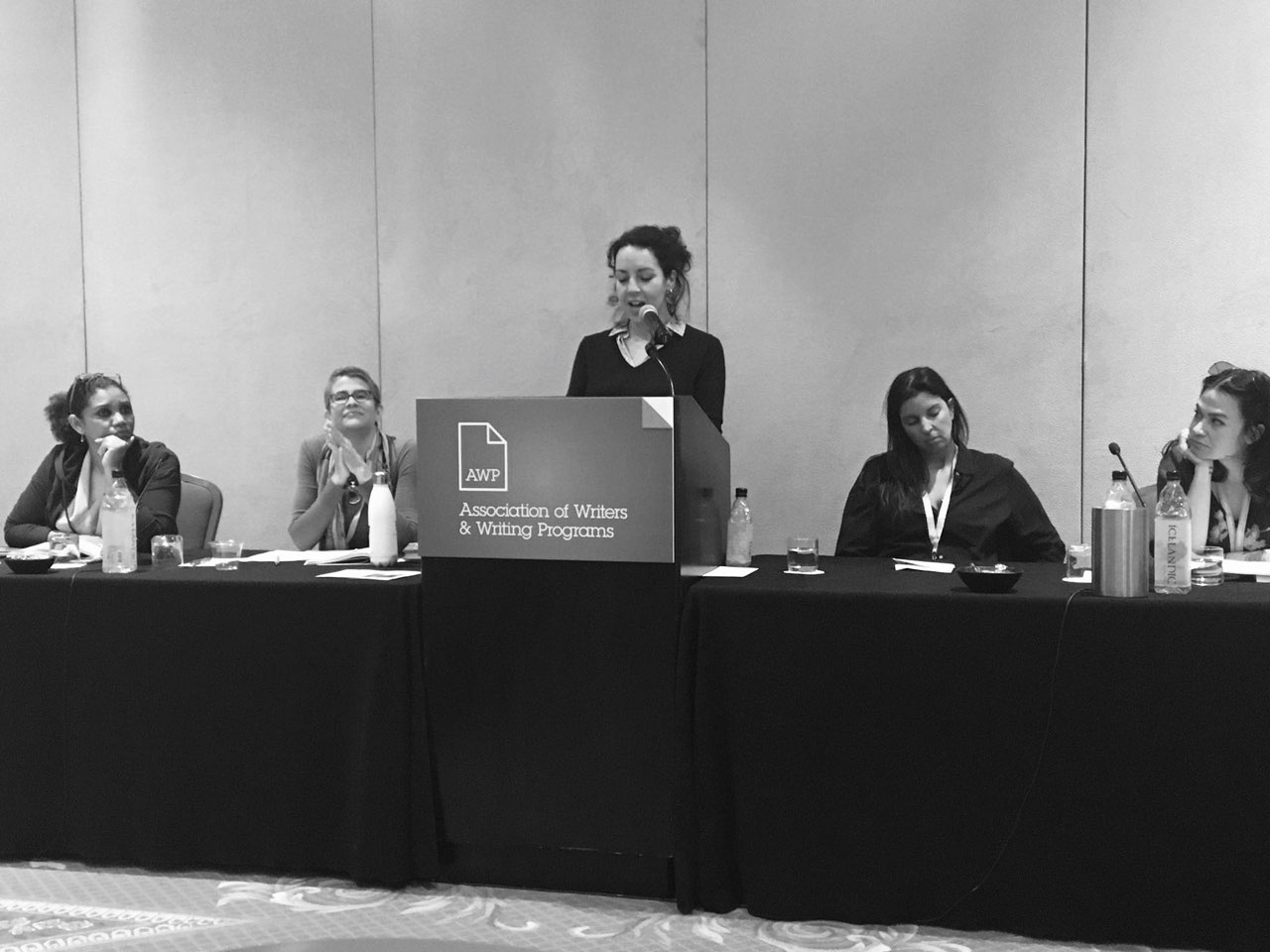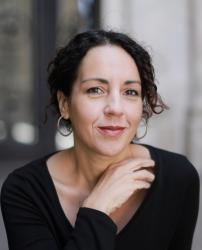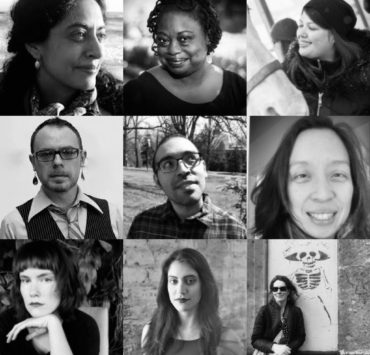
AWP Panel: Aster(ix) Five Year Later, A Conversation with Angie Cruz, Patricia Engel, Stephanie Elizondo Griest, Nelly Rosario and Marissa Johnson Valenzuela
In 2013 when we started Aster(ix) we didn’t know what we were committing ourselves to, but for the past five years the journal has been fueled with urgency, love and desire for a space that could house our wild tongue, imagination and vision.
The conceptual workings, the collective drive, the roots of Aster(ix) were born in 1997 when Marta lucía Vargas, Adelina Anthony and I built WILL: Women in LIterature and Letters, a collective of women writers of color committed to social justice and community. Back then many of us were just starting out, unpublished, some of us the lone POC in our MFA programs. Many of these women from WILL are now on the Aster(ix) masthead and are contributors to the journal.
So for five years now alongside co-founder Adriana Ramirez, Aster(ix) continues to be shaped and reshaped through ongoing conversations and questions we ask of ourselves but also of each other. This conversation at AWP centered around the questions: Why do this work? Who is responsible for our work? What does a space where we can be our true selves look like? How can we mind meld, heart meld, spirit meld our bodies, and resources toward our collective goals? Is it possible to have a space of literary freedom?
Angie Cruz: I would like to jumpstart this conversation sharing some of your needs and urgencies as writers at this moment and what are some of the things that excite you in this contemporary moment. I am also wondering if any of you have ideas on possible transformative spaces for WOC/artists and writers?
Nelly Rosario: I’m thinking about silence and about visibility. About the need for space and silence to work. At the same time, lack of visibility creates a vacuum. People ask about new work, especially when there are not too many of us represented in literature. Can we afford to stay in the cave? There’s always the tension of coexisting between the inside and the outside worlds. Between practicing the profession and staying in the field. The professionalization of identity, another question. Being asked to anthropologize the writing process, although I’m interested in all kinds of things.
Stephanie Elizondo Griest: Last night, I was reading an issue of Aster(ix) and found the conversation with Sandra Cisneros where Angie mentioned how a lot of writers of color have a challenge placing their work. Especially when their work is not performing their identity politics. She also mentioned a tendency for women of color not to submit their work at all. I actually do submit work regularly–a ton of work, especially to one prominent magazine that shall remain nameless. I have queried them twelve times in the last decade, and when I say query, I mean that I write a lengthy, detailed proposal that took months of research. For ten years now, I’ve been writing all sorts of journalistic stories about two communities in particular: Chicanos and Native Americans. Every single time I would send the editor one of my pitches, he would write back and say, “Great story, too local.” For ten years. “Great story, too local.” There’s actually something wonderfully woke about his response: like, we are spirits all around us kind of local. But I don’t think that’s what he meant. And simultaneous with that, the response I would get from secondary publications was always: “Great story, too depressing.” So that’s what I think is so special about Aster(ix). We are our own kind of local! We don’t have to explain ourselves. We can just be..
AC: One of the things I struggle with is work-life balance. Finding time for people I love, doing the work I want to do, doing my own creative writing, but feeling an urgency to do more, like this is not enough. And I’m thinking about the conversation Stephanie mentions with Sandra Cisneros that we published in our Fall 2018, issue, Dirty Laundry, and one of the things she talks about is how she felt this need to rescue because she was given this gift, this bestseller that everyone was reading, and in return she wanted to give back. And how the demand of the organization’s work affected her writing time. So she pulled away from that work to focus on her creativity. But of course I was like if not us then who will do the work. Work, like we are trying to do for Aster(ix). How do we find a way, like Nelly was saying, to do the work in the field versus the work of being public, the demand of being public when we are one of the few Latinx writers with published books. I wonder how you all continue to negotiate this–Marissa can you speak to your commitment to teaching, working in prisons while trying to finish your book.
Marissa Johnson Valenzuela: I teach at community college full-time. I have ninety-eight students. I love my students, but it’s a lot of work. During Spring Break this year, I was in prison. I was teaching a creative writing class. The men there were like, what are you doing here? They were questioning my motives. And I agreed, but not in the way I think they meant. Who am I? What am I doing here? This is my spring break. I could be on a beach right now. And they were like, woah, you’re going too far. We laughed. It made me think about how maybe there is something wrong with me. And I probably do need to find more of a balance. We’re living in what feels like the worst horror telenovela. The thing I find myself urgently needing more than ever is joy. Imagination and alternatives. Now we’re seeing through everything. More people than ever are realizing, oh, capitalism really is dependent on our misery—what else is possible? And I think that is something that writers and artists offer: alternative paths. But what I look to and what I’m hoping for is joy. Admittedly, I find a lot of joy in pretty sad shit (prison), but it’s not all that. I think offering an alternative vision of how to be with each other, that’s the type of thing Aster(ix), and small presses and independent weirdo things do really well. It’s offering other narratives and a space to be ourselves. They’re not neat little packages. So going back to this idea of seeing folks who look like you or have your narrative: how important that is. Because it helps you imagine something else for yourself. And imagine something else for everyone. The book I have next to me here is tied to the novel I’m writing, it’s a collection of Zapatista speeches and one of the things that stuck out when I was going through it recently was how it’s much easier to die than to live. And so, what can living look like?
AC: I feel like all of us are struggling with how to manage our time so we can do all the things, especially our creative work. Maybe we can give each other ideas on how to create a life where we can continue our commitment to our communities and do the work?
Patrica Engel: In my case, I think I sort of figured out that in finding balance, there’s no balance. It’s never going to happen. And basically my whole life is just shifting the balance so that things can get done.
AC: How do you do that?
PE: With sacrifices. There are times when everything will get neglected just so I can write and actually get something done. Meaning, I won’t go out, I won’t see friends, people close to me will feel my isolation, my physical activity will suffer, my nutrition. Everything will suffer except the writing. And the work will be good. And then there are other times when my personal life is flourishing and everyone around me is happy because I’m present, but I’m not getting any writing done. Teaching is also a big timesuck. I used to always ask more experienced writers, how do you do it? And sometimes I would get really hostile answers. They would be like, “You just deal with it!” But now I realize in my case, once I stop asking that question, then I don’t have that anxiety anymore. It’s just a constant shifting of things to make the space. And that’s okay. It’s okay. You don’t have to be operating at maximum capacity, one hundred percent productivity, all the time, in every way. Life happens, and you know, you have to let life happen, and then there are times when art happens, and you gotta make room for that too.
SEG: I made a choice a long time ago that writing was the endeavor that I would pursue in this lifetime, and I have not strayed from that. All I wanted was to travel and to write about those travels and the people I encountered during those travels. I never bought a house or acquired children or pets or plants. I was nomadic for many years and lived in several different countries. This is my path. And for many years, I doubted this path nearly every second of the way.
Then last September, I got diagnosed with ovarian cancer, a cancer that many women die from. Once I recovered from the shock of the diagnosis, I felt a galactic shot of euphoria. Turns out, I had made the right decision after all. I was so grateful that I had spent so much time writing books, because they are now out in the world, and would continue to be so, even if I wasn’t. I realized that if everything ended, I would have no regrets. I had lived the life I wanted to live. I was out in the world, I was meeting people, I was writing, I was speaking, I was activating, I was being inspired at every turn. That in and of itself became a life well lived. So if you think this is your path too, trust it. You are drawn to it for a reason. Don’t second guess yourself. Go for it..
NR: I’ve learned a lot about slowing down from my parents. My mother slow-cooks, we talk. Then we got her an iPad, and it was funny to watch her on it. Just incongruent, you know–she’s, like, slapping it, doesn’t understand windows, the typical age disconnect. Giving her this new kind of time–screen time– made me feel a little guilty. I mean, now she can watch her Dominican talk shows and international dramas, do her word searches and read recipes, so it’s great. But now we all sit with our screens, in separate but connected spheres of time. We speak faster, interrupt thoughts…So yeah, I’ve been thinking a lot about our shifting relationship to time and its relationship to isolation, how much more aware of it I am when alone in my apartment. Someone actually referred to me as a “reclusive writer,” which made me cringe. Reclusive as in creepy man who lives in the woods? Or as in I’m not posting on Facebook all the time? But reclusive is what many of us have become. I’m trying to turn away from screens, ignoring my phone, writing by hand, going by the river to write. This slowing down slows down clocks at every scale, on and off the page. Magical things happen physically to the story on the page that I somehow miss onscreen. What I’m feeling, dreaming, being gets encoded in the body, then onto the page. A snake once appeared to me at the river, and I put that in the story. All kinds of stuff has happened while I’m there, at water’s edge. So I think the only way to manage time is to not manage it so hard, slow it down. This is the only solution I have, because this whole thing about perfection and trying to do everything, I just can’t. It causes too much stress. I’m not interested in breadth, I’m interested in depth. And I don’t want to create shallow work that is everywhere. What does all this mean geometrically? What does this all mean in terms of vertical distance? I take a lot of walks. The story starts moving from the body.
MJV: For me, it’s about trying to cut things out. Recently I was hanging out with Justin Torres and Zinzi Clemmons and they stopped me and said, Marissa, you do a lot of things, you need to stop and step away. You need to finish this book. We need you. And that’s why I want to say their names. We are friends but not super close friends. It was like, oh you see me and you’re right. It’s hard, because for me, my writing comes out of those spaces. And teaching and organizing are also things I’m good at. I became a poet, in part, because I wasn’t good at working on the book during the semester. Many of my students are high needs, and they’re amazing, but it doesn’t leave a lot of space and energy for writing a novel. Before that, I did social work, and the last thing you want to do after a day of working with the poorest people in Philadelphia is keep writing your book. I mean, I’m lucky I didn’t develop a drinking problem to be honest. Anyway, the point being is balancing and honoring the writing as well. And being able to look at the big picture. So this summer, I’m not going to teach in the summer for the first time ever. And just be broke, and try to make space and take that space. Finish this book. Work life balance is a constant negotiation, but I wouldn’t be the writer I want to be if I stopped doing all the other things. And then I need to try not to worry that we are probably going to go on strike.
AC: I think there’s the idea that if we’re not out there, like in social media for example, we’re outside the conversation. If we are not moving fast or writing things that can be taken in quickly we are less relevant, but for me writing is really slow. Maybe that’s true for all of us, our book projects, our research, etc.. And I do think that there are ways we can shut everything out and make time for the work but circling back to what Nelly said at the beginning of this conversation what is the cost of being in the field? What are people’s expectation? Why should we care?
Many years ago I was hosting Maxine Hong Kingston for an event. My son was two and I couldn’t find a babysitter! And I was freaking out because I wanted to be there with her. And she said, go be with your son. You don’t have to be here with me. You could read my book. And I was like, what do you mean?! You’re Maxine Hong Kingston! I don’t want to miss out on what you’re going to say. And she was like, I made that same mistake when I was your age. I had a kid, and I would give him marshmallow bags to keep him busy so I could finish my book. She goes, I’m still writing books. But I missed him. I wasn’t present. And now, he doesn’t want to hang out with me! He has other people. I missed that experience.
So I guess this all goes with what you all have been saying in different ways, about living your life the way you want to live it. Whatever you decide to do: be a parent, be a writer, it’s all good. To forgive yourself for not being or doing everything. I think it’s a major thing. It’s impossible to do everything really well at the same time. But you could do things well if you parcel it out. And how important it is to create a community that supports you. And being that we are all here to support Aster(ix) and to think about why or if we should be doing this work, I want to thank you for supporting the journal and the space we are trying to create, a space that has an elasticity for play. And also for missing deadlines. Happy Five Years!
Panelists:
Angie Cruz is the author of Soledad and Let It Rain Coffee. She has a forthcoming novel, Dominicana with Flatiron, NY.
Patricia Engel is the author of The Veins of the Ocean, It’s Not Love, It’s Just Paris, and Vida. She is currently a visiting Professor of practice and University of Miami.
Stephanie Elizondo Griest is the author of four books, including Around the Bloc: My Life in Moscow, Beijing, and Havana; Mexican Enough; and All the Agents and Saints: Dispatches from the U.S. Borderlands. She is Associate Professor of Creative Nonfiction at UNC-Chapel Hill.
Nelly Rosario is author of Song of the Water Saints, currently writer/researcher for the MIT Black History Project and the 2017–18 W. Ford Schumann Distinguished Visiting Professor in Democratic Studies at Williams College.
Marissa Johnson-Valenzuela who have published in multiple genres and is the founder of Thread Makes Blanket press, currently teaching at Community College of Philadelphia.

Angie Cruz's novel, DOMINICANA is the inaugural bookpick for GMA book club, and the Wordup Uptown Reads selection for 2019. It was also longlisted for the Andrew Carnegie award in excellence in fiction for 2019. It was named most anticipated/ best book in 2019 by Time, Newsweek, People, Oprah Magazine, The Washington Post, The New York Times, and Esquire. Cruz is the author of two other novels, Soledad and Let It Rain Coffee. She's the founder and Editor-in-chief of the award winning literary journal, Aster(ix)and an Associate professor at University of Pittsburgh where she teaches in the MFA program. She splits her time between Pittsburgh, New York, and Turin.







